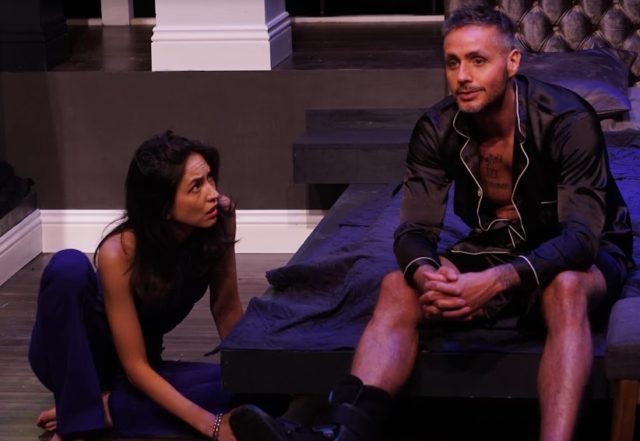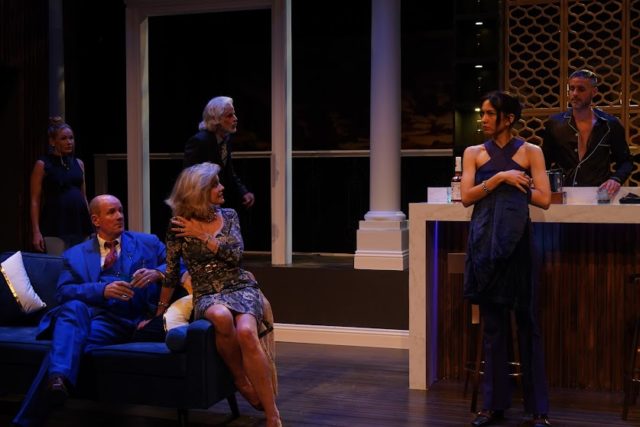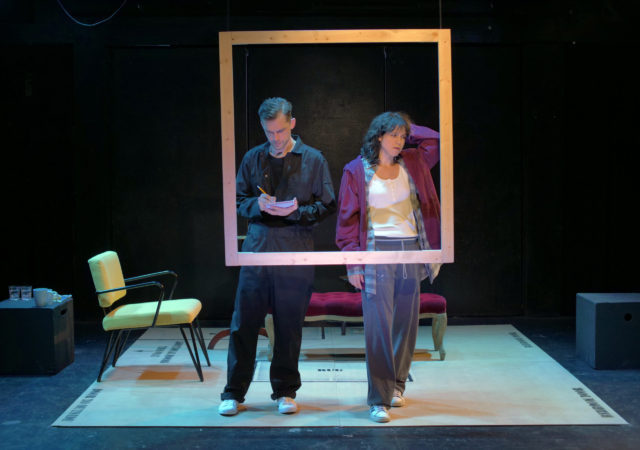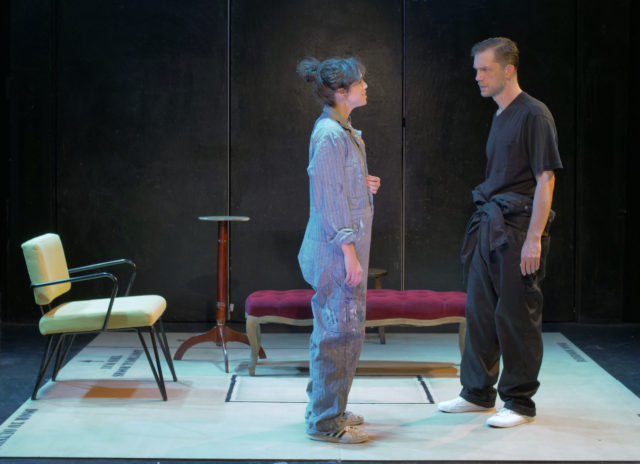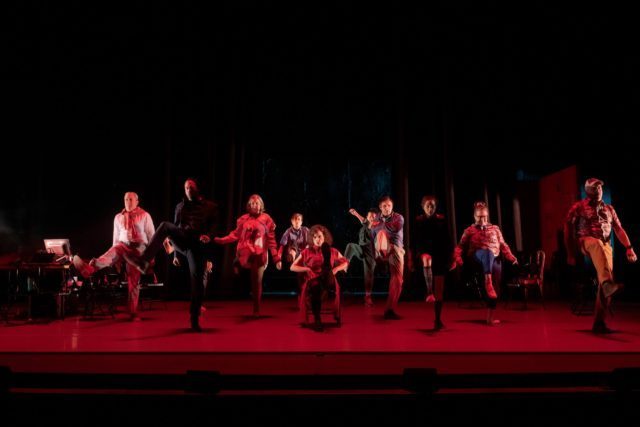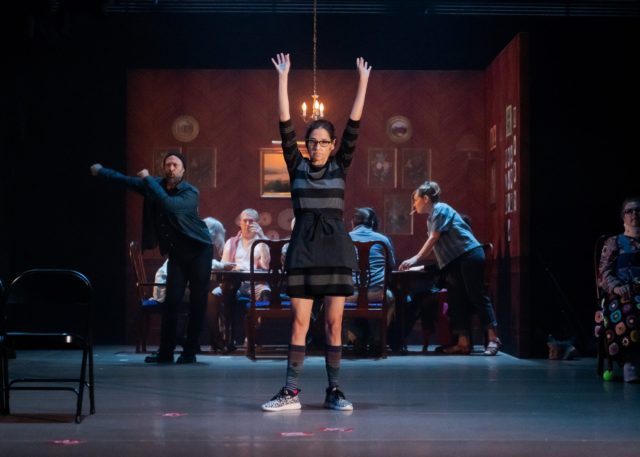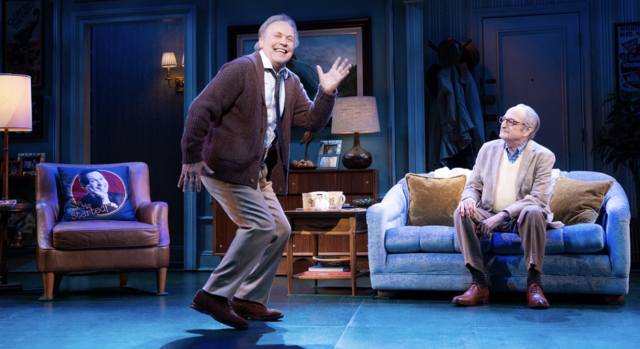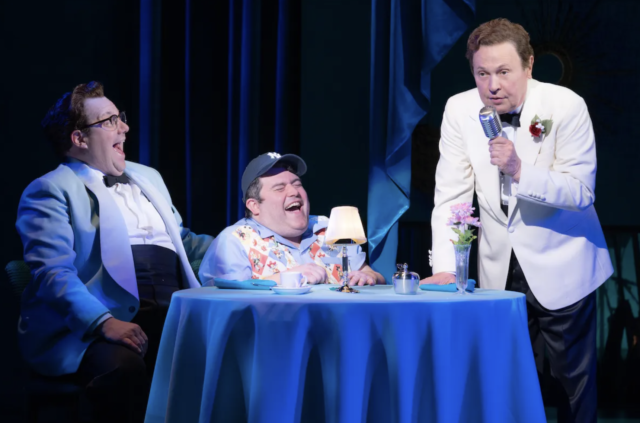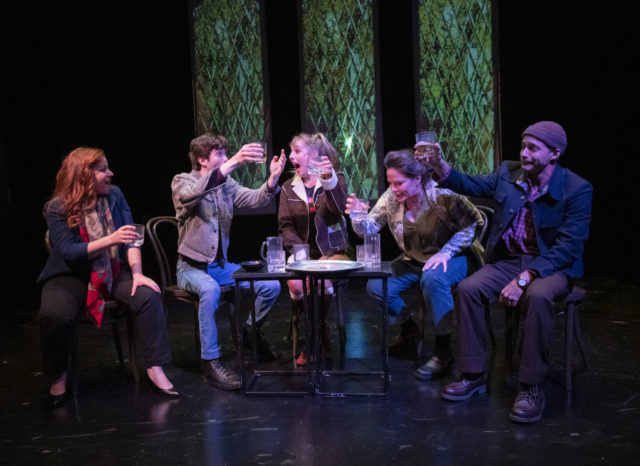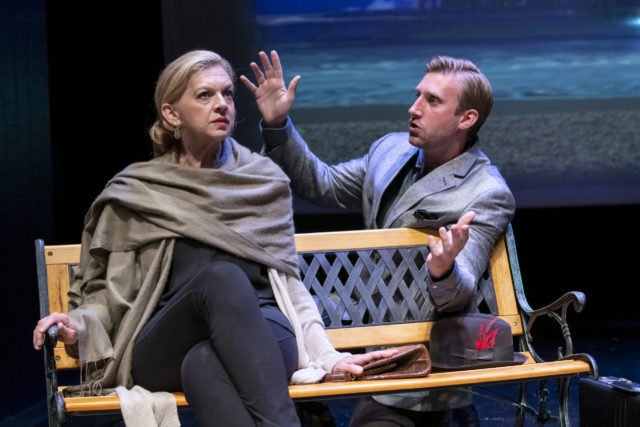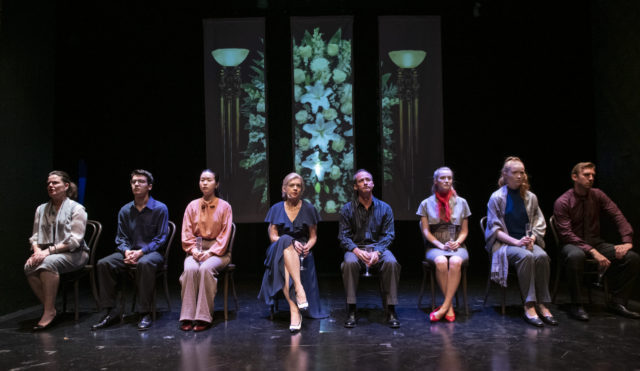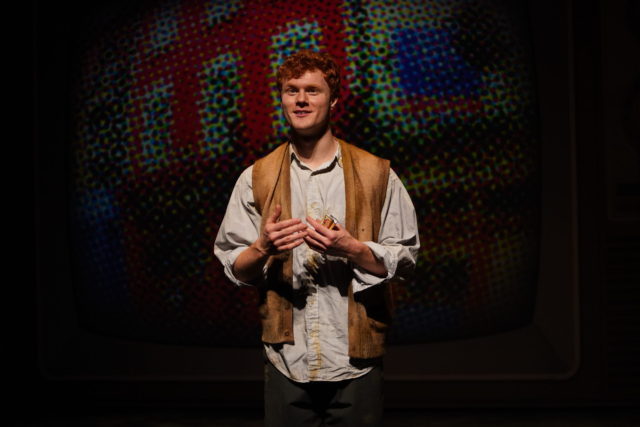
Nicholas Barasch sparkles as Francie Brady in world premiere musical at the Irish Rep (photo by Carol Rosegg)
THE BUTCHER BOY
Irish Repertory Theatre, Francis J. Greenburger Mainstage
132 West 22nd St. between Sixth & Seventh Aves.
Wednesday – Sunday through September 11, $50-$70
212-727-2737
irishrep.org
Five years ago, high school senior Asher Muldoon came to the Irish Rep with a musical adaptation of Patrick McCabe’s award-winning 1992 novel, The Butcher Boy, about thirteen-year-old Francie Brady (Nicholas Barasch), a red-haired lad on a destructive path to do some very bad things in the village of Clones in County Monaghan in the mid-1960s. Shortlisted for the Booker Prize, the novel was turned into a well-received 1997 dark comedy by Neil Jordan starring Stephen Rea, Fiona Shaw, Brendan Gleeson, Milo O’Shea, and Sinéad O’Connor. Muldoon’s show opened last night at the Irish Rep, the first new musical developed by the company in eight years. Unfortunately, it could use some slicing and dicing; while the narrative parts work well, the musical numbers don’t bring home the bacon.
Nicholas Barasch is terrific as Francie Brady, a neighborhood bully from a dysfunctional family; he narrates the story in a series of flashbacks, disconcertingly oblivious to the full weight of his actions. “When I was a young lad twenty or thirty or forty years ago I lived in a small town where they were all after me on account of what I done on Missus Nugent,” he says at the beginning. “Now, it started with Joe and me out at the hide we had built. ‘Death to all dogs who enter here!’ we said. Except us of course.”
Francie’s mother, Annie (Andrea Lynn Green), suffers from severe depression, and his father, Ben (Scott Stangland), is a nasty alcoholic and failed trumpet player. Francie’s uncle, Alo (Joe Cassidy), his father’s brother, left his girlfriend, Mary (Kerry Conte), without saying goodbye, to try his luck in London. He comes to a party as a conquering hero until the two siblings have a bit of a contentious row.
Francie hangs around with his best friend, Joe Purcell (Christian Strange), fishing; seeking to create mayhem; doing whatever he can to obtain his favorite candy, Flash Bars; and bullying Phillip (Daniel Marconi), Mrs. Nugent’s (Michele Ragusa) nerdy son, stealing his treasured comic books. “Oh, if we lived like this forever we’d be fine / So why can’t we live like this forever?” Francie and Joe sing.
Upset at Francie’s treatment of Phillip, Mrs. Nugent visits Mrs. Brady and complains, “I’ll tell you something, Annie, it’s no wonder your boy is such a mean little runt. His father lying round in bars morning to midnight, a disgrace to the family, to the whole town, he’s no better than a pig. A PIG.” Francie, as narrator, tells the audience, “She didn’t know what she was doing then, Mrs. Nugent.” Mrs. Nugent then adds, “Pigs! Sure the whole town knows it. PIGS!!!”
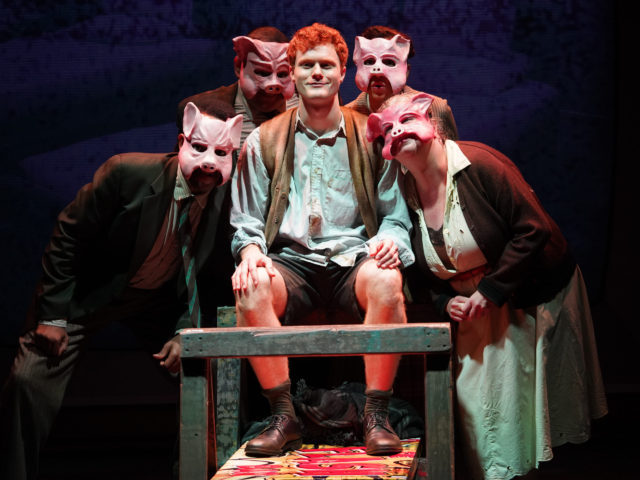
Four pigs spur Francie Brady (Nicholas Barasch) to do bad things in The Butcher Boy (photo by Carol Rosegg)
The “pigs” comments get to Francie, who does not want to be seen as inferior to anyone. He soon finds himself accompanied by four imaginary pigs (Teddy Trice, Carey Rebecca Brown, Polly McKie, and David Baida), a quartet of adults wearing pig masks and goading him on. “Well, I’ll be damned if I let all those piggies take what’s mine / This town ain’t big enough for both of us, you filthy swine / Let’s open up an abattoir and / Drain their blood for boudin noir / Save room for sausage,” one of the pigs sings. The four then chime in together, “Cause those big fat piggies have too much to say / Show em we’re not afraid to go to war / Unless those pigs grow piggy wings and fly away / Within a day or two you won’t know who is you and who is piggy.”
Francie runs away to Dublin (using the elegant pseudonym Algernon Carruthers), believing, “We can all just stay together / And I know that we’ll be fine / And the world will be back where the world is supposed to be,” but he winds up back in Clones with his family, gets a job working for Mr. Leddy (Baida) the butcher (“I’m used to seeing pigs,” Francie says), and has to redefine his place in a community where everyone seems to have grown up around him but he has stayed the same. It doesn’t go well.
Directed by Irish Rep cofounder Ciarán O’Reilly (Autumn Royal, The Emperor Jones), The Butcher Boy is an intense look into the mind of a troubled teen whose dark fantasies lure him away from reality. The show begins on Charlie Corcoran’s superb set, a kind of confined hideout with wooden slats at the right and left side covered in colorful comic-book regalia and a large, old-fashioned black-and-white television screen in the back, where Francie watches The Lone Ranger, Captain Z-Ro, and The Twilight Zone, including clips from the famous TZ episode “It’s a Good Life,” in which Bill Mumy portrays a young boy with special powers that allow him to control every part of life — and death — in a small town (“You’re a bad man! You’re a very bad man!”). During intermission, the classic “Eye of the Beholder” episode is shown, in which Rod Serling asks, “What kind of world where ugliness is the norm and beauty the deviation from that norm?” The pig masks are reminiscent of two TZ episodes, but the musical overdoes the comparisons by having Phillip morph into Serling during an otherwise harrowing scene.
There are also references to John F. Kennedy, America’s first Irish-Catholic president, who was almost brought down by the Bay of Pigs invasion, and three iterations of women named Mary, all played by Conte, a clever melding of the Virgin Mary and Mary Magdalene, a trio of characters who intrigue Francie.
Francie’s descent into mental illness is both heartbreaking and frightening, particularly as the United States is involved in a wide-ranging discussion about mental health, especially as it relates to disturbed young white males who are prone to mass shootings. Barasch (Hadestown, She Loves Me) walks the fine line of Francie’s sanity with an infectious charm even though we know that things are going to get bloody at any moment; his smile, and bright red hair, lights up the room.
However, the musical numbers (“Big Fat Piggies!,” “My Lovelies,” “Francie Gets Mad,” “Don’t Forget About Me”), featuring limited, tongue-in-cheek choreography by Barry McNabb, actually detract from the story; they feel tacked on, like garnish, merely extending the show to a too-long two hours and twenty minutes (with intermission). I found myself rooting for them to end, like television commercials, so I could get back to the regularly scheduled program, which I was otherwise immersed in, enjoying thoroughly.
Muldoon, who is currently an undergrad at Princeton, wrote the book, music, and lyrics; the score is performed by the Slaughterhouse Five, consisting of conductor and musical director David Hancock Turner on keyboards, Danielle Giulini on violin, Joseph Wallace on bass, Martha Hyde on reeds, and Mike Rosengarten on guitar and banjo, playing behind the television screen, only occasionally visible.
The Butcher Boy could have used some more tenderizing and trimming before being served, as it has the promise of being one delicious meal where audiences wouldn’t mind making pigs of themselves.
